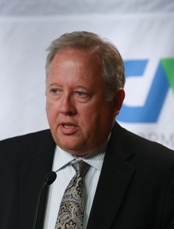
An Americas Agenda for the World
The Inter-American Democratic Charter is a watershed in how the region understands democracy.
Established in 1996 as a joint initiative of CAF – Development Bank of Latin America, the Inter-American Dialogue, and the Organization of American States, the annual CAF Conference brings together nearly 1,000 world leaders to debate and discuss the most pressing issues in the Western Hemisphere. The conference has grown to become the primary forum for policy makers and analysts, journalists, government officials, business leaders, entrepreneurs and investors, and civil society leaders to review progress in the Americas and address pending challenges.
The 22nd CAF Conference was held over September 5 and 6, 2018 at the Newseum in Washington, DC. The Americas are at a crossroads economically, politically, socially, and technologically. Against the backdrop of false starts and stagnation, conference participants explored solutions to intractable challenges facing the region as well as ways to take better advantage of important opportunities. Discussions focused on removing barriers to a free press in the region; realizing the promise of Chinese trade and investment; raising productivity and growth through technological innovation and structural reforms; ensuring that economic growth is environmentally sustainable; and analyzing political trends and elections across the hemisphere.
In their introductory remarks, Luis Carranza, president of CAF – Development Bank of Latin America, Luis Almagro, secretary general of the Organization of American States (OAS), and Michael Shifter, president of the Inter-American Dialogue, welcomed attendees and highlighted the pertinent themes that the 22nd Conference set out to address. Carranza emphasized region-wide need for both greater fiscal consolidation in the context of rising deficits and for enhanced investments to boost low productivity. He also noted that Latin America’s growth in the long term will necessarily rely on a closer relationship with China. Finally, he pointed to the institutional challenges that must be addressed in the short and long term to improve efficiency, enhance transparency, reduce corruption, and ensure freedom of the press.
Secretary General Almagro warned that the central challenge facing Latin America today is the urgent need to strengthen democracy in order to preserve it. To underscore the urgency, he pointed to the rise of authoritarian governments and widespread corruption in the region.
Michael Shifter, president of the Inter-American Dialogue, noted how dramatically the CAF Conference, the Dialogue, and the region have grown and changed since 1996. He recalled that the conference began as a small gathering in the Dialogue’s conference room to discuss trade and investment in the Andean region and now convenes in the meaningful venue of the Newseum. Shifter reminded the audience that in uncertain and challenging times such as these, it is important to return to first principles, and that none is more crucial to the defense of democracy and rule of law than a free press, which is for the first time on the CAF agenda, along with other important issues such as China’s deepening economic engagement in the region, using innovation to close the productivity gap, and the views of young political leaders on how to overcome short-term thinking in their countries.
Video: Introductory Remarks (English), 22 Conferencia CAF - Bienvenida e introducción (audio de la conferencia)
As moderator of the first panel, Catalina Botero, dean of the faculty of law at Universidad de los Andes and the former OAS Special Rapporteur for Freedom of Expression, opened the discussion by highlighting the three central threats to freedom of expression in Latin America today: delegitimization of the press fostered by rising authoritarianism, violence against journalists by international drug and human trafficking organizations, and the spread of misinformation fostered by the pervasive power of the internet.
Marty Baron, editor of The Washington Post, focused his opening remarks on the challenges facing journalism in the United States today. He noted that traditional US media outlets struggle to remain profitable in the face of economic disruptions caused by the internet. Although this is not a new challenge, it is exacerbated by the Trump administration’s demonization and delegitimization of media outlets critical of his worldview. As American society has grown more polarized, the press finds it difficult to combat the spread of misinformation and doubts about the established media’s veracity. On a positive note, Baron said that while there is a generational gap in newspaper readership, there has been an increase in millennial subscribers, signaling an abiding interest in reliable news sources.
[caption id="attachment_87874" align="alignleft" width="300"]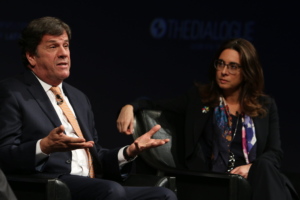 | Rick Reinhard[/caption]
| Rick Reinhard[/caption]
Editor of the Colombian newspaper El Tiempo, Roberto Pombo Holguín, noted similarities between Colombia and the United States with regard to the spread of misinformation. He held that the public does not view journalists’ work as sufficiently serious and accurate, and urged journalists to become self-critical and more engaged with society to reverse this trend. He warned that when journalism is controlled by elites and newspapers simply seek to please their owners, they will be undermined by a lack of public trust. Pombo also spoke of threats to journalists specific to Colombia that is being violently targeted by drug trafficking groups to silence critical coverage.
Carlos Reymundo Roberts, editor at the Argentine newspaper La Nación, remarked that people are more misinformed than ever, despite access to more information. He saw this paradox as a conflict between the freedom of information and the freedom of the press, since there is little curation of the information that circulates through the internet. While the old challenges against the press, namely authoritarianism and a weak economic model, came from people, the new challenges of the digital world come from manipulation of the public by algorithms.
According to Carlos Dada, founding reporter for the Salvadoran online news outlet El Faro, corruption and organized crime pose the greatest threat to journalism in Central America. Democratic backsliding and growing corruption, with the weakening of CICIG and MACCIH, have exacerbated these threats. While the global community has tried to preserve a free press with international agreements, these have had little effect in the absence of stronger institutions and justice systems to enforce treaties and laws. Since it is unlikely these structural reforms will be put in place in the short term, Dada challenged the press to persevere in their struggle to remain relevant in the face of threats and misinformation.
"We continue to struggle to come up with a sustainable economic model for the press, particularly the print press."
- Marty Baron, editor of the Washington Post
Video: Session I. 21st Century Challenges to a Free Press (English), Sesión I. Retos del siglo XXI para una prensa libre (audio de la conferencia)
China is poised to reshape economies across Latin America, providing new opportunities and challenges for the region. Isabel Hilton, editor of China Dialogue, remarked on the new, significant role China has played in Latin America, especially regarding infrastructure construction and geopolitics. While growing, China’s influence has been concentrated in select countries like Brazil, Argentina, and Peru. Hilton acknowledged that China has been accused of mercantilist trade practices that are not beneficial to Latin America. This trading relationship will likely continue, however, since China included the region in the amorphous Belt and Road Initiative in 2018.
The Peruvian minister of foreign trade and tourism, Rogers Valencia, had more praise for the Chinese influence in his country. He noted that Peru and China have a long-standing relationship dating back over 150 years to when Chinese workers landed in Peru. In more recent years, China has proven an important partner for Peru, investing $10 billion in mining, telecommunications, and infrastructure projects and maintaining free trade. He warned against scapegoating the Chinese for the region’s deficiencies and encouraged understanding for Chinese cultural values that may differ from Latin America’s.
According to Dulcidio de la Guardia, former Panamanian minister of finance, Panama only established diplomatic relations with China in 2017, yet it has enjoyed a close relationship with China as the second largest user of the Panama Canal. De la Guardia encouraged countries in the region to be strategic and maintain positive relations with both the United States and China, which brings well-established experience with transportation and energy projects.
[caption id="attachment_87871" align="alignright" width="300"]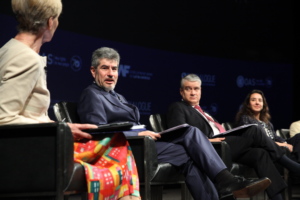 | Rick Reinhard[/caption]
| Rick Reinhard[/caption]
Tatiana Rosito, a senior fellow at CEBRI, attributed the growth of Latin America, especially Brazil, during the global financial crisis to Chinese economic stimulus. In the years since, China has grown to be Brazil’s largest trading partner in both exports and imports. Not only has China provided economic benefits, but Rosito recognized the political and social benefits of the Chinese governing model, including the outsized role of the state in providing education, health, and security.
Kevin Gallagher, director of the Global Economic Governance Initiative at Boston University, agreed that without China, Latin America would be suffering from severe economic strain. He applauded China for granting its foreign assistance without policy conditionality, which in part accounts for its success, in Gallagher’s view. However, he cautioned that the absence of policy conditionality is not without repercussions, in particular, the potential negative impact on society and the environment. Gallagher reminded the audience China is often willing to lend when CAF or the Inter-American Development Bank (IDB) might decline a loan request.
Álvaro Mendez, co-director of the Global South Unit at the London School of Economics, remarked on the fundamental changes China has brought to the region. But he cautioned that for Latin America to take full advantage of China’s investments and improve as a region, it must be careful not to become overly dependent on natural resource exports to China and instead channel Chinese investments toward addressing its massive infrastructure deficits to benefit the region in the long term.
"The Brazil-China relationship has gone from a trade relationship to an investment relationship, which requires much more maturity from both sides."
- Tatiana Rosito, Senior Fellow at CEBRI
Video: Session II. China-Latin America Relations: New Perspectives to Trade and Investment (English), Sesión II. Relaciones entre China y América Latina: comercio e inversión (audio de la conferencia)
The panel focused on the structural political and economic reforms that are needed to combat widespread economic stagnation. Tulane University economics professor Nora Lustig moderated the panel and opened by suggesting that Latin America’s economic situation might be graver than the session’s title suggests: rather than focusing on how to sustain existing growth, the panel needed to focus on how to revitalize meager growth. The US economic recovery and subsequent strengthening of the dollar provide an opportunity for stronger Latin American exports. However, Lustig noted that countries must also confront large fiscal deficits and a lack of internal integration to overcome the economic stagnation that has taken hold throughout most of the region.
Dyogo Henrique de Oliveira of the Brazilian Development Bank (BNDES) argued that Latin America continues to confront the same development and macroeconomic problems it has faced over the past 60 to 70 years. Moreover, De Oliveira warned that current demographic trends will start hurting the region over the next decade as the general population moves closer to retirement. Finally, he identified two looming economic risks that the region should plan to address: rising fiscal deficits and fluctuating exchange rates.
Jorge Familiar, vice president for Latin America and the Caribbean at the World Bank, agreed with Lustig that it was premature to talk about sustaining growth when Latin America needed to focus on strengthening growth. He also argued that social conditions have not improved across the hemisphere since the commodity boom. Familiar did acknowledge that there has been significant progress, on average, in terms of the region’s macroeconomic health. Like de Oliveira, he was concerned that 31 of 32 countries in the region have fiscal deficits, having forfeited the opportunity to save during the commodities boom. Additionally, he was troubled by popular protectionist measures limiting trade in the region. To begin revitalizing the economy, Familiar suggested strengthening regulatory and institutional frameworks for public-private partnerships, investing in human capital, and deploying a wider array of development projects.
[caption id="attachment_87856" align="alignleft" width="300"]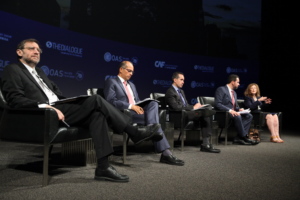 | Rick Reinhard[/caption]
| Rick Reinhard[/caption]
IDB general manager and chief of strategic development, Miguel Castilla, asserted that Latin American countries share a vulnerability to macroeconomic and fiscal shocks. He cautioned that because the region, across the board, lacks transparent institutional frameworks, it runs the risk of undermining the potential of investment projects to produce long-term positive results. To overcome the low productivity that is feeding Latin America’s economic stagnation, countries must enact structural reforms, especially in the context of the fourth industrial revolution and climate change.
Reiterating Castilla’s prescription for structural reforms, Pablo Sanguinetti, the corporate director of economic analysis and knowledge for development at CAF, observed that not only is productivity in the region fairly low, but the most unproductive sectors are in or moving to the informal sector of the economy. Even with well-designed policies, a lack of strong institutions to enforce those policies across the formal and informal sectors limits their effectiveness. Thus, structural reforms, especially those improving human physical capital, are necessary to revitalize the region’s economic growth.
Lustig asked the panel what development banks could specifically do to aid the region in its economic development. Sanguinetti suggested that development banks could act as a catalyst for third party resources and offer more imaginative products like Green Funds. Familiar suggested that the banks could work with coalitions like the Pacific Alliance to develop multi-country bonds. Questions from the audience touched on how corruption restricts economic growth. The panel unanimously concurred that corruption has been an economic and political disaster for the region. Castilla highlighted specific measures that he thought could help mitigate the effects of corruption in the region, including greater procurement and fiscal transparency, improved internal auditing of government agencies, and international support for incentives that encourage countries to adhere to international norms against corruption.
"The question is not necessarily how to maintain growth, but rather how to recuperate and revitalize it."
- Nora Lustig, Professor at Tulane University
The world is in the midst of what some experts call the fourth industrial revolution, which provides new opportunities for Latin American countries to harness technology to improve their economies. Gonzalo Chávez, an economist at the Catholic University of La Paz and moderator of this panel, explained that innovation and productivity have stagnated in the region due to a lack of entrepreneurs. Without the necessary innovation, Latin America has struggled to transition from low productivity, informal sectors of the economy to more productive and formal sectors.
Mariana Costa, founder and CEO of Laboratoria, argued that entrepreneurs are key to innovation because they take risks that nation states and large corporations avoid. Likewise, she warned that efforts by policymakers to legislate and regulate emerging economic sectors may undermine the very environment that these disruptive technologies create. Costa suggested that formal education should focus more on hard skills like computer coding and soft skills like intellectual curiosity. To help induce a new generation of entrepreneurs, she thought that alternatives to higher education should be offered and highlighted.
The head of public positioning and wholesale business for Telefónica, José Juan Haro, disagreed with Costa that large corporations did not have the potential to innovate; rather, he saw the wide reach and capabilities of large corporations like Telefónica as strengths that can induce new ideas and technologies. He clarified that large corporations do struggle to implement technological innovations quickly enough, since they often must unlearn old processes. But when they are successful at implementing new technology they do benefit from their scale and region-wide network of operations. However, innovation by corporations partially depends on the private sector’s sense of social responsibility to support human capital and invest in local infrastructure. To strengthen Latin American economies in the digital age, Haro argued that corporations should take an active role in human capital development, a task made easier with new digital platforms and partnerships with established institutions, like regional development banks.
[caption id="attachment_87865" align="alignright" width="300"]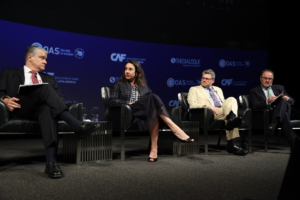 | Rick Reinhard[/caption]
| Rick Reinhard[/caption]
For corporations to invest in human capital, education systems must be dynamic and innovative, according to the president of EARTH University, Arturo Condo. He warned, however, that the nexus between academia and the private sector that is required to induce this innovation was lacking. Condo also suggested other strategies to improve productivity, including agricultural innovation, urban-rural development, and the creation of “Silicon Valleys” in Latin American countries. Condo took issue with how some policymakers measure productivity, saying that average or macro-level productivity was not the most important measure to address. Rather, he held that individual-level analysis and creative problem solving were necessary to improve people’s well-being.
From the perspective of international organizations, informal economies present a major stumbling block for innovation that will be difficult to overcome, according to Santiago Levy, IDB vice president for sectors and knowledge. The least productive sectors in Latin America are largely informal businesses, which also absorb the most labor in the economy. Levy was less optimistic than other panelists that reforms and changes could transition informal businesses into more productive, formal professions. Governments have largely encouraged this lack of formalization by structuring regulatory and fiscal systems to incentivize firms to stay small. Levy concluded his remarks by noting that a singular focus on human capital and technological transition would not solve the productivity gap; instead, governments must overhaul public policy, including fiscal and welfare policies, to allow Latin American economies to adapt and thrive.
"Three structural changes are affecting productivity in Latin America: demographics, technology, and climate change."
- Miguel Castilla, IDB General Manager and chief of strategic development
Video: Session IV. Escaping the Middle-Income Trap: How Can Latin America Use Innovation to Close the Productivity Gap? (English), Sesión IV. ¿Cómo puede América Latina cerrar la brecha de productividad? (audio de la conferencia)
In an era of both economic stagnation and climate change, this panel centered on how to build a public majority to support a balanced agenda of economic growth and ecological preservation. Andrea Bernal, a journalist with the Colombian media network NTN24, moderated the panel and asked participants to explore several possible solutions, including new technologies and independent government ministries.
Urenna Best, director of the National Secretariat for the Development of Afro-Panamanians, asserted that including historically marginalized populations like indigenous and Afro-descendent communities is essential in the conversations regarding development and growth. The political climate in Latin America caused by a raft of political corruption scandals has encouraged a reformulation of policies and institutions, which provides an opportunity to include historically marginalized communities in efforts to develop more effective policies. Likewise, Best held that development policies that affect marginalized communities should originate from those communities to ensure that the policies are effective.
[caption id="attachment_87859" align="alignleft" width="300"]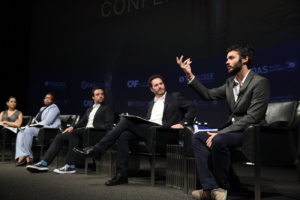 | Rick Reinhard[/caption]
| Rick Reinhard[/caption]
Former Colombian vice minister of the interior Luís Ernesto Gómez contended that attitudes about the economic feasibility of development have been changing in recent years. Citizens no longer view sustainable development as an unachievable luxury, as demonstrated by the number of discussions on environmental issues in the lead up to the 2018 Colombian elections. Gómez argued this was partly due to new technologies, like UberPool Express, that encourage green alternatives to previously less environmentally friendly activities like commuting. However, he asserted that it is important for the government to communicate effectively and frequently with citizens about new development policies to prevent public backlash, ideally utilizing new technologies and platforms like change.org.
Picking up on that theme, Hernán Larraín, president of the Chilean political party Evópoli, emphasized the importance of political parties as intermediary institutions. Chile’s success in providing both economic development and environmental protection is partially due to its democratic system that relies on political parties as intermediaries between the people and government institutions. Larraín noted, however, that corruption poses a grave threat to the established trust between government institutions and civil society.
Juan Maquieyra, president of the Buenos Aires Public Housing Institute of Argentina, focused his remarks on setbacks to environmentally sensitive and equitable development throughout the region. He noted that economic growth has often been concentrated in urban areas, allowing rural economies to wither while cities thrive. A more community-based approach that focuses on bottom-up rather than top-down prescriptions for sustainable development is needed in Latin America. To buttress this approach, Maquieyra suggested harnessing technology to improve responses to democratic demands.
"No community can tell us more about sustainability and preservation of resources than native populations and Afro-descendants."
- Urenna Best, director of the National Secretariat for the Development of Afro-Panamanians
Video: Session V. Thinking Politics Beyond the Short Term: How to Generate Consensus for Sustainable Growth (English), Sesión V. ¿Cómo generar consensos para un crecimiento sostenible? (audio de la conferencia)
The final panel of the conference centered on notable cases of political and economic change that would likely remain significant for the region in the upcoming year. Dialogue president Michael Shifter moderated the session and noted that disenchantment with democracy and political parties, high levels of polarization, and persistent corruption are not new to the region.
Concerning Colombia, Monica Pachón, dean of the School of Political Science, Government, and International Relations at the Universidad del Rosario, was pessimistic that newly elected President Iván Duque would be successful in pursuing his ambitious agenda. She noted that, like most other Latin American countries, Colombia relies on the president to craft the legislative agenda. Duque, however, lacked a supermajority in Congress and refused to submit to the usual patronage system, making unlikely any success for an aggressive agenda of tax and fiscal reform.
Turning to Paraguay, Luis Bareiro of Última Hora remarked that the country has enjoyed some success while also facing deep structural challenges. With regards to the economy, Paraguay has had a stable monetary policy supported by a fiercely independent Central Bank, as well as a relatively high level of fiscal responsibility for 15 years. Despite these positive economic signals, deeper political and social issues plague the country. Educational reform is badly needed —schools have been selling diplomas and teacher quality is abysmal — however, such reform would meet strong resistance from teachers’ unions. The new president, Mario Benítez, has faced public pressure to enact judicial and campaign finance reform, as well as political reform to combat corruption.
Jesús Silva Herzog Márquez, a professor at ITAM in Mexico, declared that Andrés Manuel López Obrador’s election in July of 2018 was nothing short of a “political earthquake.” Unlike previous administrations, López Obrador’s political party Morena controls the Congress as well as a number of state legislatures and governorships. Silva Herzog contended that Morena’s strong institutional control of the country severely hurt the other two major political parties, PAN and PRI, and possibly put Mexico’s democratic transition in jeopardy. While López Obrador is a “textbook populist”, the professor suggested that he might govern like a pragmatic politician, following a similar leadership and political style as when he was mayor of Mexico City.
[caption id="attachment_87868" align="alignright" width="300"]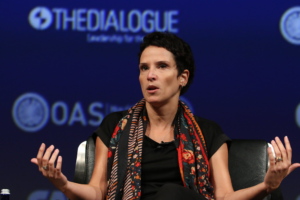 | Rick Reinhard[/caption]
| Rick Reinhard[/caption]
The director of the Latin American Studies and Emerging Markets program at Johns Hopkins SAIS, Monica de Bolle, spoke to the upcoming elections in Brazil. She held that there were no contemporary precedents of the 2018 presidential elections, in that the race was unlikely to be a contest between the well-established Labor Party (PT) and PSDB party. After former PT president Lula da Silva was barred from running, de Bolle noted that Jair Bolsonaro of the Social Liberal Party and Ciro Gomes of the Democratic Labor Party were leading in the polls. After the elections, de Bolle noted that the next government would face a number of challenges, including a large fiscal deficit, a fragmented Congress, and a need for pension reform.
Michael Penfold, a professor at IESA in Venezuela, concluded the discussion by painting a bleak picture of the region’s most notorious political and economic crisis. He stressed two characteristics of the crisis: the Maduro regime has used technology to control and oppress the populace, and Venezuelans were fleeing in droves for their survival. Moreover, he was pessimistic that the crisis would be resolved any time soon, since the Maduro regime has been successful in blocking all challenges to its government. Compounding that obstruction, the opposition has been fragmented and uncoordinated in offering an alternative to Maduro or forcing him to resign. Ultimately, Penfold identified three possible conclusions to the crisis: an international intervention, a coup, or an internal implosion of the regime. Regardless of how the crisis ends, the biggest challenge facing Venezuelans and the international community will be re-democratizing the country and revitalizing government institutions, which Chávez and Maduro have decimated.
"These are the strangest elections Brazil has ever had. There is no comparison with previous elections."
- Monica de Bolle, director of the Latin American Studies and Emerging Markets program at John Hopkins SAIS
Video: Session VI. Elections and Political Trends in Latin America: A Focus on Brazil, Colombia, Mexico, Paraguay, and Venezuela (English), Sesión VI. Elecciones y evoluciones políticas: Brasil, Colombia, México, Paraguay y Venezuela (audio de la conferencia)
The Inter-American Democratic Charter is a watershed in how the region understands democracy.
Summary of the XIV Annual CAF Conference
Regional integration, social inclusion, and the need for a more competitive business climate—discussed at the XVIII Annual CAF Conference
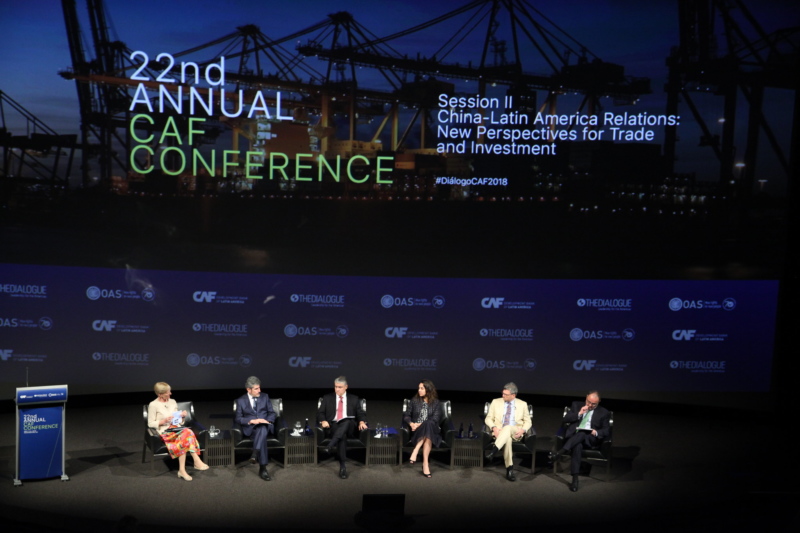 Rick Reinhard
Rick Reinhard
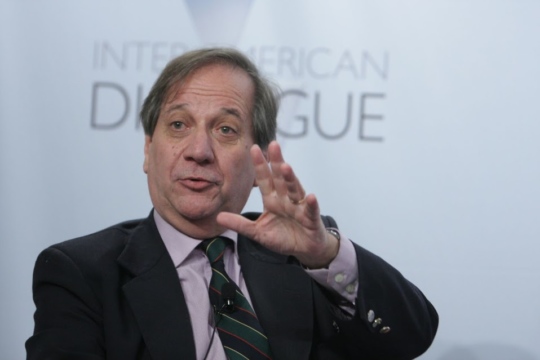
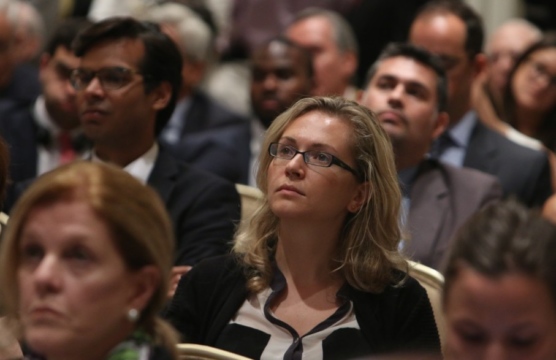 Video
Video